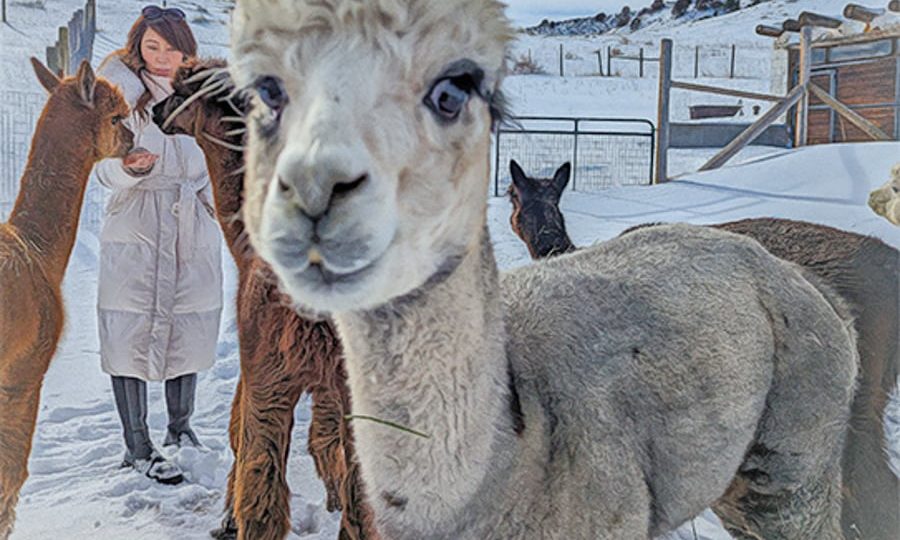Denver, Colorado alpaca adventure tours 2023: Alpacas hum; they make a sound like “mmm,” according to Alpaca Ventures. However, they also shriek when danger is present, and make a sound similar to a “wark” noise when excited. Fighting males scream, making a warbling bird-like cry. Alpacas in a herd all use the same area as a bathroom instead of defecating in random areas like many animals do. This behavior helps control parasites, according to the FAO. Males often have cleaner dung piles than females, according to Alpaca Ventures. Females tend to stand in a line and all go at once. See extra details on alpaca experiences in Colorado.
Still, seeing alpacas on a ranch in what many consider to be a big city out West can be a bit mind-boggling. What is life like on the ranch? What does an alpaca eat? Do they run and play with each other? Are alpacas high maintenance and easy to care for? Get all your questions just like this (and more!) answered. Your expert guide will fill you in on what it’s like to live and work on an alpaca farm. It offers views of the gorgeous surrounding areas : Do you want to see Colorado mountain views without needing to hike? Whether you’re traveling with a large group, have small children in tow, or just don’t like hiking, this experience will allow you to take in scenic mountain views in a unique way. When you go behind the scenes on the ranch, you learn about much more than just the animals. You have the opportunity to talk about the economy, trade, production, local handmade goods, and so much more.
As herbivores, alpacas only eat vegetation. They eat mostly grass, but their diets can also include leaves wood, bark or stems. Like other ruminants, alpacas have a three-chambered stomach that digests the roughage efficiently. Unlike other grazers, alpacas don’t eat much. According to the Alpaca Owners Association, a 125-lb. (57 kg) animal only eats around 2 lbs. (907 grams) per day. In general, alpacas eat 1.5 percent of their body weight each day.
Are alpacas easy to care for? Alpacas are a small and relatively easy livestock to maintain. They stand about 36′ high at the withers (where the neck and spine come together) and weigh between 120 to 200 pounds. Like other types of livestock, alpacas need basic shelter and protection from heat and foul weather. Good nutrition is essential for healthy animals. Hay, minerals, and fresh clean water should be available at all times. Many alpaca owners also provide a nutritional supplement. Under a veterinarian’s direction, alpacas need vaccinations, preventive medication, and deworming. Alpacas also require yearly shearing to keep them cool in the summer. Alpacas do not have hooves; instead they have two toes, with hard toenails on top and a soft pad on the bottom of their feet. Their padded feet minimize the impact on the pasture. To ensure proper foot alignment and comfort, their toenails must be trimmed as needed.
Are alpacas an “exotic species,” or are they considered simply “livestock?” Alpacas have been raised as domestic livestock for thousands of years. Since the end-product of alpacas is their fleece, like sheep, they are classified as livestock by both the United States and Canadian federal governments. Do alpacas spit? All members of the camel family use spitting as a means of negative communication. They do get possessive around food, and may express annoyance by spitting at other alpacas that they perceive are encroaching on “their” food. Also, they often spit at one another during squabbles within the herd (usually involving two or more males). From time to time alpacas do spit at people on purpose, but it is more common that humans get caught in the crossfire between alpacas, so it’s best to study their behavior and learn to avoid the most vulnerable situations.
Nowhere else but here will you have the same opportunity to experience Alpacas in the open beauty of nature. Get nose-to-nose with Pablo Picasso just one of our resident furry friends. Come explore the scenic mountain views where you can hand-feed a healthy snack to our friendly Alpacas. Live entertainment is part of the fun. Learn fascinating facts about these majestic creatures, and go behind the scenes into a fiber producing Alpaca farm. Chances are, you’ll make a new friend on your visit. For all ages, this is a once in a lifetime opportunity. See even more information on meetalpacas.com.
Are alpacas easy to train? Alpacas are very smart animals and are fairly easy to train. It is best to start training them when they are young so that they will accept a halter and learn to follow on a lead. Many owners also enjoy training them to walk through obstacles. Some even compete with their alpacas at shows where they walk over, through, and around objects and also jump over small hurdles. Also, it is helpful to train alpacas to ride in a trailer or van if they ever need to be transported to a show or another farm. Alpacas are easy to transport, as they normally cush (lay down with their legs folded under them) when traveling. Be aware that alpacas should not be tied up when traveling.



